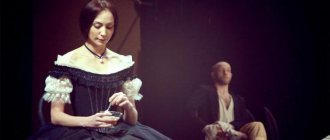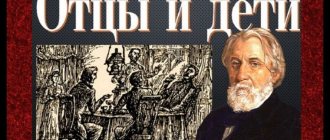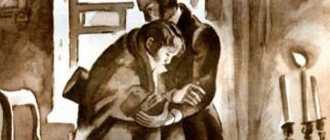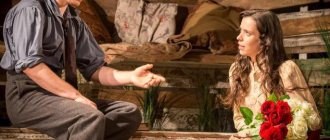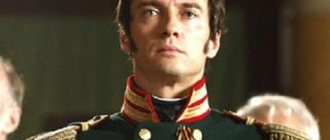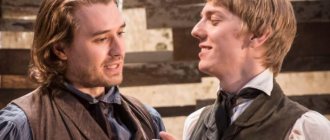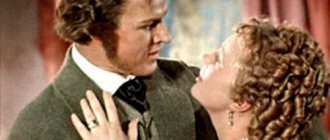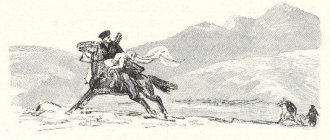A turning point in the history of Russia in the second half of the 19th century was the abolition of serfdom (1861). The adoption of the reform was a dangerous but necessary decision of Emperor Alexander II.
The country was divided into two conditional camps: conservative-serf owners and Westerners, representatives of liberal views.
I. S. Turgenev foresaw the onset of a turning point and captured it on the pages of his novel (1862). The events of the book unfold shortly before the reform, in 1859, demonstrating a previously unprecedented image - the image of Bazarov in the novel “Fathers and Sons.”
The new hero caused conflicting emotions among the public. The controversy about “Fathers and Sons” did not subside among critics. M.A. Antonovich called Bazarov “Asmodeus of our time” (1862). In his essay of the same name, he reproached the author for abandoning his ideals and ridiculing the new generation.
M. N. Katkov, on the contrary, accuses the writer of exaggerating Bazarov’s merits. The revolutionary publicist A. I. Herzen had a different opinion: “You (Turgenev) wanted to flog the children, but you flogged the fathers.” D.I. Pisarev tries to get closer to a truly correct understanding of the author’s intention and theme in the critical essay “Bazarov” (1862).
In the main character, the critic notes the qualities inherent in a true revolutionary, who can positively influence the fate of his country and move it forward.
Origin of Evgeniy Vasilievich
Turgenev brings to the fore a hero of non-noble origin. Bazarov comes from a poor peasant family, the son of a district doctor. He speaks triumphantly about his origins: his grandfather was a peasant and plowed the land.
He deliberately keeps silent about the biography of his maternal grandfather, thereby emphasizing the lack of admiration for the noble class.
In his life, Bazarov achieved everything through hard work ; he never asked for a loan from his family.
Parents
Vasily Ivanovich Bazarov is a former military doctor, a simple and open person. While retired, he continues to heal without charging any fee for it. Bazarov’s father says directly about himself that he is the son of an ordinary staff doctor, emphasizing his non-noble origins (he calls himself a plebeian).
Arina Vlasevna is a hereditary noblewoman, the daughter of Second Major Vasily. True, after marriage she gained weight and completely forgot her previous life.
Bazarov is a source of pride for his parents ; they are even somewhat afraid of their son (the mother is afraid “that he might get bored”), of his statements in front of him (“what if he doesn’t like it”), of manifestations of their parental love (“he doesn’t like this”). .
Evgeniy Vasilyevich is his beloved and only son. After the death of “Enyushenka” (that’s what Bazarov’s parents called), the old people mournfully live out their lives, visiting their son’s grave.
↑ Test of love
Bazarov has a consumerist attitude towards women.
He “was a great hunter of women and female beauty, but he called love in the ideal sense, or, as he put it, romantic, nonsense, unforgivable foolishness...” “If you like a woman,” he used to say, “try to achieve some sense; but you can’t - well, don’t, turn away - the earth is not aligned like a wedge.” It’s not for nothing that he says before going to see Madame Odintsova: “There is life...” And during an explanation with Odintsova, “it was not the trembling of youthful timidity, not the sweet horror of the first confession that took possession of him: it was passion that beat within him, strong and heavy - a passion similar to anger and, perhaps akin to her,” and his face became “almost brutal.”
However, not all of his declarations are relevant.
At the first meeting with Odintsova, Bazarov, to Arkady’s surprise, blushes.
After a while, “ his blood burned as soon as he remembered her;
he could have easily dealt with his blood, but something else had taken possession of him, which he had never allowed, which he always mocked, which outraged all his pride. <…> ...He was indignantly aware of the romanticism in himself .” But a few days ago, Bazarov asserted: “A man who put his whole life on the card of female love and, when this card was killed, became limp and sank to the point that he was not capable of anything, such a person is not a man, not a male.” "
Bazarov really doesn’t want to look like a weak-willed boy in Odintsova’s eyes who is unable to control himself. “Love,” he tells her, “is a feigned feeling,” emphasizing that he himself “came to his senses a long time ago and hopes that others have forgotten his stupidity.” It is characteristic that it is in this episode that Turgenev seeks to emphasize his authorial objectivity. According to him, “they both thought they were telling the truth. Was there truth, complete truth, in his words? They didn’t know it themselves, and even less so the author.”
Despite all of Bazarov’s aversion to “romanticism” and to those who are capable of “being scattered” with love, he experiences his unsuccessful romance extremely hard. In his parents' home, “the fever of work disappeared from him and was replaced by dreary boredom and dull anxiety.” In front of others, Bazarov tries not to reveal the depth of his experiences. Not without self-irony, he says to Arkady: “...Sometimes it is useful for a person to take himself by the crest and pull himself out, like a radish from a ridge; I did this the other day...” And during a quarrel with Pavel Petrovich, Bazarov shows inconsistency. “From a theoretical point of view,” he says, “a duel is absurd; But from a practical point of view, this is a different matter.”
Bazarov is right, of course, in believing that the whole story with the duel “resembles a little like a French novel,” but can his consideration be considered (Pavel Petrovich challenges Bazarov to a duel only because he himself is in love with Fenechka - “it’s clear as day”) true?
Hero's appearance
The portrait of the main character is interesting. Evgeniy Vasilyevich is by no means a handsome man: a thin face, a wide forehead, a flat nose at the top, a pointed nose at the bottom, large eyes, drooping sideburns. Bazarov's red hands characterize him as a working man who is characterized by hard work.
Describing his hero, Turgenev notes that he was not fashionably dressed - he wore a long robe with tassels. Appearance is not the most important thing for a hero; it is just a shell behind which the mind hides.
It is worth paying attention to the speech and vocabulary of the hero. Bazarov is a man of few words; he speaks briefly and to the point, emphasizing his determination and confidence. He uses various terms in his speech, which confirms his passion for natural sciences. The hero’s vocabulary is evaluative and popular: “grated kalach”, “glorious fellow”.
History of creation
The idea of “Fathers and Sons” began to take shape in Turgenev in 1860, when he was in England on the Isle of Wight. The prototype of Evgeny Bazarov was a young doctor from the provinces, a casual travel companion of Turgenev, with whom the writer was traveling on the train. The trip turned out to be difficult - the track was covered with snow, the train stopped for a day at some tiny station. Turgenev managed to communicate closely with his new acquaintance; they talked all night, and the writer turned out to be very interested in his interlocutor. A casual acquaintance of the writer turned out to be a nihilist. The views of this man and even his profession formed the basis for the image of Bazarov.
Ivan Turgenev
The novel itself was created quickly, in comparison with the speed with which Turgenev worked on other works. Less than two years passed from idea to first publication. The writer drew up the plan for the book in Paris, where he arrived in the fall of 1860. There Turgenev began working on the text. The author planned to finish the work by the spring of that year in order to bring the text ready for publication to Russia, but the creative process stalled. It took the winter to write the first chapters, and by the spring of 1861 the novel was only half finished. Turgenev wrote in a letter:
“It’s not working in Paris, and the whole thing is stuck in half.”
The author finishes the work in the summer of 1861, already in his homeland, in the village of Spasskoye. By September, edits were made, and Turgenev returned with the novel to Paris to read the text to his friends, correct and add some things. In the spring of 1982, “Fathers and Sons” was published for the first time in the magazine “Russian Bulletin”, and in the fall it was published as a separate book.
Evgeny Bazarov
In this final version, the image of Bazarov is made less repulsive, the author rids the hero of some unsightly features, and this is where the evolution of the character ends. Turgenev himself described Bazarov in the list of characters as follows when he compiled a preliminary portrait of the hero:
"Nihilist. Self-confident, speaks abruptly and little, hard-working. Lives small; He doesn’t want to be a doctor, he’s waiting for an opportunity. He knows how to talk to people, although in his heart he despises them. He does not have and does not recognize an artistic element... He knows quite a lot - he is energetic, and can be liked by his swagger. In essence, the most barren subject is the antipode of Rudin - for without any enthusiasm and faith... An independent soul and a proud man of the first hand.”
Bazarov's Nihilism
A nihilist is a person who denies priorities. Bazarov is pleased to deny that he is not characterized by democratic judgments.
Bazarov is an empiricist; he recognizes only what can be witnessed with the help of the senses. He considers all feelings from the perspective of everyday use: love, poetry, art - all this has no value if it is not suitable for use.
Outlook on life
Attitude to life consists of relationships to others, to work, to oneself.
Attitude towards parents
For Bazarov, his mother is just a housewife. He is ironic about her naive simplicity and piety. She cannot be a worthy interlocutor for him. He doesn’t even know what he can talk about with someone who has read only one book in his life, and that’s not a scientific work, but some kind of sentimental novel.
Father Bazarov reproaches him for adhering to traditional methods of healing, relying on God's help.
Despite the difference in worldview, Bazarov loves his parents, but, unlike them, he does not speak about it openly, hiding his emotions under the guise of nihilistic beliefs.
His feelings are revealed during the period of illness. He openly tells Odintsova how much he loves his old people, that you won’t find anyone as bright as them anywhere else.
Attitude to the aristocracy
For Evgeniy Vasilyevich, the aristocracy is a useless layer of society. The hero does not share Pavel Petrovich Kirsanov's inspired attitude towards the nobility (argument at the dinner table, ironic behavior at a party).
According to Bazarov, the nobles do not bring benefit to the state, but only boast of the regalia of their ancestors. Bazarov calls the main occupation of aristocrats idleness and idle talk.
Lifestyle and habits
Bazarov leads an active lifestyle. He wakes up early and goes to bed late most days. He spends most of his time conducting experiments on frogs - such research will make him more competent as a doctor: “Bazarov brought a microscope with him and spent hours fiddling with it.”
We invite you to familiarize yourself with the characterization of Pavel Petrovich Kirsanov in Ivan Turgenev’s novel “Fathers and Sons”
Evgeniy does not shy away from society either. He willingly pays visits to different people. He behaves there depending on the situation. In the company of aristocrats (unless it is a dinner in a narrow circle), he is generally reserved and rarely interferes in the conversation. When communicating with nobles of “lower rank” or with people similar to him in social status, Eugene behaves actively and often freely. Sometimes his liberties are so provocative that they seem indecent.
Evgeniy loves to eat hearty and tasty food. Does not deprive himself of the pleasure of drinking wine, mainly in large quantities.
The essence of nihilism by Evgeny Bazarov
Bazarov's position in society is unusual and contradictory. He is an adherent of nihilism, a philosophical movement of the 60s of the 19th century, widespread in Russia. At its core, this movement contained an extremely negative attitude towards all manifestations of bourgeois-noble traditions and principles. Bazarov explains the essence of his philosophy as follows: “We act by virtue of what we recognize as useful,” said Bazarov. “At the present time, the most useful thing is denial - we deny.”
Personal qualities
The first thing that catches the reader’s eye is Eugene’s simplicity. We learn about this distinctive feature of his from the very first pages of the novel - his friend Arkady repeatedly draws his father’s attention to this fact during their trip to the family estate. “A simple man,” says Kirsanov the son. Nikolai Petrovich’s first impressions of the meeting with Bazarov were blurred by joyful experiences - after a long separation, he finally waited for his son, but still a certain precipitate towards Evgeny firmly settled in the mind of Kirsanov the father.
Bazarov has an extraordinary mind. This applies not only to the medical field, but also to other fields of activity. This state of affairs became the reason for the development of such a negative quality as self-confidence. Evgeny is clearly aware of his mental superiority in relation to most of the people around him and cannot resist harsh comments and criticism. An accompanying quality to this extremely unattractive bouquet is also added pride. In Pavel Petrovich, such qualities seem incompatible with Bazarov’s type of activity. Uncle Arkady claims that a person with such a character cannot be a full-fledged district doctor.
Evgeniy thinks that he is “a positive, uninteresting person.” In fact, he is quite an attractive person. His views are non-standard, they are not much like the generally accepted ones. At first glance, it seems that he acts on the principle of opposition and opposition - Eugene contradicts virtually any thought, but if you look carefully, this is not just a whim. Bazarov can explain his position, give arguments and evidence indicating that he is right. He is quite a conflicted person - he is ready to start an argument with a person of any age and position in society, but meanwhile, he is ready to listen to his opponent, analyze his arguments, or pretend to make them. In this regard, Bazarov’s position lies in the following thesis: “Prove to me that you are right and I will believe you.”
Despite Evgeny’s readiness for discussion, he is very stubborn, it is difficult to convince him; throughout the novel, no one managed to completely change his attitude towards certain things: “When I meet a person who would not give up in front of me, then I will change my opinion about myself "
Attitude to art
Art for Bazarov is an empty, frivolous activity; he does not see any practical significance in it. Examples confirming the hero’s judgment are presented in the table:
Bazarov sees neither pros nor cons in art. However, it is worth considering that poetry, painting and music cultivate a person’s aesthetic qualities, developing him as a person.
Quotes from Bazarov about love
Bazarov’s attitude towards love can be divided into two stages: before falling in love with Odintsova and after. The unloved Bazarov treated a woman as a “woman” who was not difficult to master.
Beauty is perceived rudely by Bazarov , and Odintsova herself seems to the hero to be an exhibit in an anatomical theater.
However, love changes the hero. In a fever, he especially acutely feels a passionate feeling - that he has fallen in love with Anna Sergeevna Odintsova.
Interesting Facts
- The scriptwriters added some expressive moments to the film “on their own”; Turgenev did not have this. The famous scene where Bazarov confesses his love to Anna takes place among the glass and crystal that fill the room. These decorations are designed to emphasize the fragility and beauty of the noble world, into which Bazarov invades like a “bull in a china shop,” and the fragility of the characters’ relationships.
- The script also included a scene in which Anna gives Bazarov a ring. This moment is missing in the text, but it was introduced to emphasize the internal similarity of Bazarov with Pavel Petrovich (the latter’s beloved once did the same for him).
- Director Avdotya Smirnova initially intended to give the role of Pavel Kirsanov to her own father, actor and director Andrei Smirnov.
Vladimir Bogin as Evgeny Bazarov
- Scenes in the estates were filmed in real “Turgenev” places. To film Kirsanov’s estate, the film crew was allowed to use an outbuilding on Turgenev’s Spasskoye-Lutovinovo estate. The estate itself is a museum where many originals are stored, so filming is not allowed there. Restoration was planned in the outbuilding. In another Turgenev estate - Ovstyug, near Bryansk - they rented the estate of Anna Odintsova. But the house of Yevgeny Bazarov’s parents had to be built specifically for filming. For this purpose, old buildings were searched throughout the villages.
- The ten-month-old child of one of the museum employees on Turgenev’s estate played the role of Fenechka’s little son. In Bryansk, local theater workers were involved in the filming, who played the roles of servants.
Alexander Ustyugov as Evgeny Bazarov
- To create just the outfits for the ladies, costume designer Oksana Yarmolnik had to spend 5 months. The costumes, however, are not authentic, but are deliberately close to modern fashion, so that it is easier for the viewer to sympathize with the characters and delve into the vicissitudes of their lives. Completely reconstructed costumes made the film look like a historical play and distanced the viewer from what was happening on the screen, so it was decided to sacrifice authenticity.
- Scenes supposedly taking place on city streets were actually filmed on location at Mosfilm.
- The dishes and wallpaper that the viewer sees in the frame were created specifically for filming, so that they correspond to the spirit of the times.
